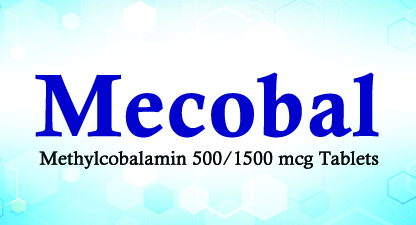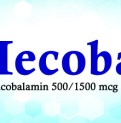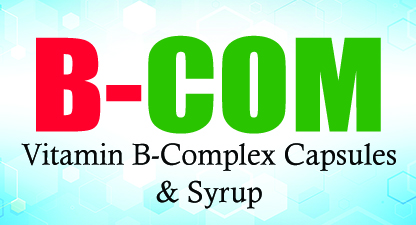MECOBAL
Methylcobalamin is a vitamin B-12 co-enzyme that occurs in blood and cerebrospinal fluid. Methylcobalamin is taken by nerve tissues more actively and extensively than other homologues of vitamin B12. It accelerates the synthesis of nucleic acid in bone marrow as well as promotes the maturation and division of erythroblast and heme synthesis, resulting in an increase in erythrocyte (RBCs) production. It is normally involved in the metabolism of every cell of the body, especially affecting the DNA synthesis and regulation but also fatty acid synthesis and energy production. Vitamin B12 is used to regenerate folate in the body.
- Categories : Vitamins
- Share Now :
MECOBAL 0.5/1.5
Generic Name: Methylcobalamin
Therapeutic Category: Anti-anemic agent/Vitamin/Nerve Supplement
Composition: Mecobal 0.5
Each film coated tablet contains Methylcobalamin 500 mcg
Mecobal 1.5
Each film coated tablet contains Methylcobalamin 1500 mcg
Pregnancy Category: C
Presentation: Available in the pack size as 10 tablets X 10 strips
Mechanism of Action
In Neuropathy
In a healthy person, the nerves are protected by a sheath made of a fatty substance called myelin. Vitamin B12 plays an extremely important role in both the synthesis and the maintenance of myelin, so B12 deficiency can cause the protective myelin sheath to deteriorate over time.
It exerts neuronal protection by promoting regeneration of injured nerves and antagonizing glutamate-induced neurotoxicity.
Recently several lines of evidence demonstrated that Mecobal may have potential analgesic effects in experimental and clinical studies. For example, Mecobal alleviated pain behaviors in diabetic neuropathy, low back pain and neuralgia.
Mecobal improved nerve conduction, promoted the regeneration of injured nerves, and inhibited ectopic spontaneous discharges of injured primary sensory neurons.
In addition, Mecobal improved nerve conduction in either patient of diabetic neuropathy.
In anemia
Deficiency in one or both of these vitamins causes megaloblastic anemia, a disease characterized by the presence of megaloblasts. Megaloblasts occur when inhibition of DNA synthesis causes asynchronous maturation between the nucleus and the cytoplasm. Clinical manifestations are similar to those of other types of anemia, with the exception of cobalamin deficiency megaloblastic anemia, which presents distinctive neurological symptoms.
Administering supplements of Mecobal restore body reserves of Methylcobalamin.
Indications
- Diabetic Neuropathy
- Peripheral Neuropathy
- Orthopedic Neuropathy
- Bell’s palsy*
- Vitamin B12 deficiency
- Prophylactically after total gastrectomy* or total ileal resection
- Megaloblastic anemia
- Homocysteinemia*
- Male’s impotence
- Sleep disturbances
Dosage:
Route of administration: Oral
- Vitamin B12 Deficiency
For adults, the daily requirement of vitamin B12 is probably about 1 to 2 mcg.
- Neuropathy
Acute cases of neuropathy: 1.5 mg per day
For chronic cases: 1-5 mg per day in divided doses
- Bell’s Palsy: 0.5-1 mg OD
It may be administered medicinally in an intravenous injection. Research suggests that oral administration may provide similar benefits to injectable forms.
- Others:
Children below 12years: 0.5 mcg once a day before meal
Children above 12years and adults: 1.5 mcg once a day before meal
Pharmacokinetics
- Absorption: Bind to intrinsic factor, a glycoprotein secreted by the gastric mucosa and are then actively absorbed from the GI tract
- Protein bindingand Distribution: Bound to specific plasma proteins called transcobalamins, transcobalamin II appears to be involved in the rapid transport of the cobalamins to tissues.
- Route of elimination: Renal Excretion accounts for 40-80%; also excreted in bile.
- Half-life: 12.5 hours
Adverse Effects
Common: Headache, Nausea, Vomiting, Anorexia, Diarrhea, Tachycardia, Sweating, Skin Rash, Hot sensation,
Precautions
- This medication should be used only as directed during pregnancy or lactation.
- Patients with history of liver disease
Contraindications
MECOBAL is contraindicated in the following populations and situations:
- Hypersensitivity to any component of product.
Drug Interactions
- Absorption of vitamin B12 from the GI tract may be reduced by Neomycin, Amino salicylic acid, Histamine H2-antagonists, Colchicine
- Serum concentrations may be decreased by concurrent administration of oral contraceptives
*Terminologies:
Bell’s palsy: paralysis of the facial nerve causing muscular weakness in one side of the face.
Gastrectomy: surgical removal of a part or the whole of the stomach.
Homocysteinemia: An abnormal accumulation of homocysteine, which can be measured in the blood, can be a marker for the development of heart disease. Elevated levels of homocysteine in the blood appear to increase the risk of heart attack, stroke, peripheral vascular disease, and venous thromboembolism
Indications
- Diabetic Neuropathy
- Peripheral Neuropathy
- Orthopedic Neuropathy
- Bell’s palsy*
- Vitamin B12 deficiency
- Prophylactically after total gastrectomy* or total ileal resection
- Megaloblastic anemia
- Homocysteinemia*
- Male’s impotence
- Sleep disturbances
Dosage
Route of administration: Oral
- Vitamin B12 Deficiency
For adults, the daily requirement of vitamin B12 is probably about 1 to 2 mcg.
- Neuropathy
Acute cases of neuropathy: 1.5 mg per day
For chronic cases: 1-5 mg per day in divided doses
- Bell’s Palsy: 0.5-1 mg OD
It may be administered medicinally in an intravenous injection. Research suggests that oral administration may provide similar benefits to injectable forms.
- Others:
Children below 12years: 0.5 mcg once a day before meal
Children above 12years and adults: 1.5 mcg once a day before meal



